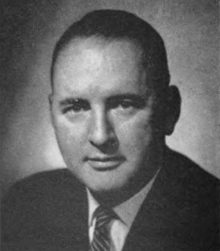William H. Bates
| William H. Bates | |
|---|---|
 |
|
| Member of the U.S. House of Representatives from Massachusetts's 6th district |
|
|
In office February 14, 1950 – June 22, 1969 |
|
| Preceded by | George J. Bates |
| Succeeded by | Michael J. Harrington |
| Personal details | |
| Born |
William Henry Bates April 26, 1917 Salem, Massachusetts |
| Died | June 22, 1969 (aged 52) Bethesda, Maryland |
| Political party | Republican |
| Alma mater | Brown University, 1940, Harvard Graduate School of Business Administration, 1947 |
| Military service | |
| Service/branch | United States Navy |
| Battles/wars |
|
William Henry Bates (26 April 1917 – 22 June 1969) was a member of the United States House of Representatives notable for his staunch support of the United States Navy.
Bates was born in Salem, Massachusetts, the son of Nora (Jennings) and Representative George J. Bates of the 6th Massachusetts Congressional District, who also served as Salem's mayor. He attended local schools and graduated from Worcester Academy in 1936. He received his undergraduate education at Brown University, Providence, R.I., graduating in 1940. Following graduation from Brown, he enlisted in the United States Navy in July 1940 and was commissioned as ensign in the Naval Reserve on 30 January 1941. Bates then received instruction at the Naval Reserve Supply Officer's School at the Naval Medical Center, Washington, DC, before serving successive tours of duty at the Washington Navy Yard and in Constellation (IX-20).
He remained a naval reservist, and by 1949 had become the supply officer for the 4th Naval District. While Bates was stationed there, his father was killed in a plane crash at the Washington National Airport on 1 November 1949.
Bates resigned his reserve commission — he had attained the rank of lieutenant commander by that time — on 14 February 1950, to fill the seat of his late father in the United States House of Representatives. For nearly two decades, until his death in 1969, Bates staunchly advocated a strong military posture for the United States. On the Joint Congressional Committee on Atomic Energy and the House Armed Services Committee, he vigorously supported the development of nuclear-powered naval vessels. He also vigorously backed incentive pay programs and the establishment of better housing facilities for servicemen. He constantly sought means to enhance the training, caliber, and morale of military personnel.
...
Wikipedia
